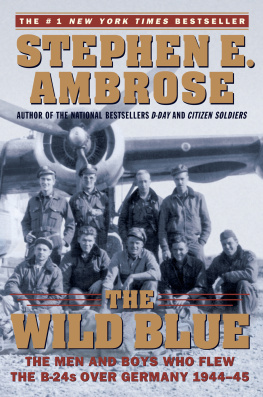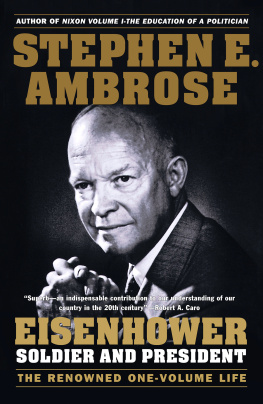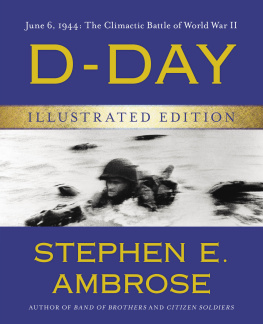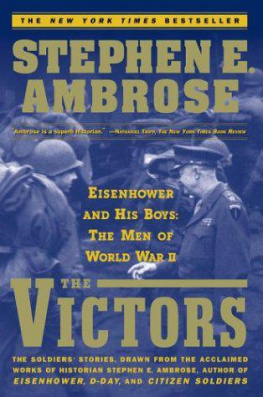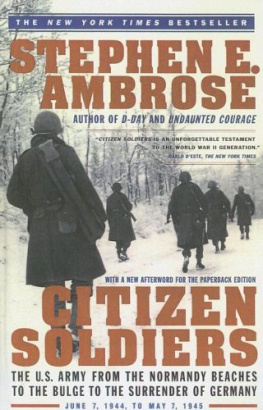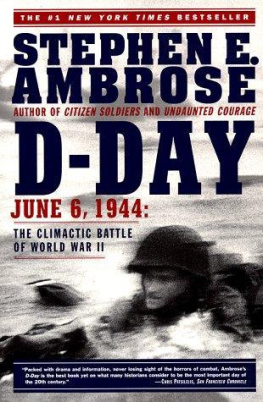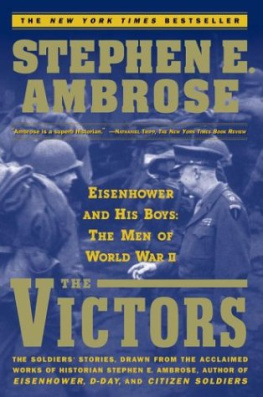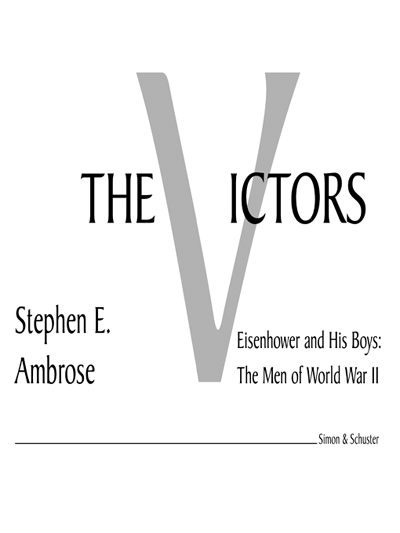
Thank you for downloading this Simon & Schuster eBook.
Join our mailing list and get updates on new releases, deals, bonus content and other great books from Simon & Schuster.
C LICK H ERE T O S IGN U P
or visit us online to sign up at
eBookNews.SimonandSchuster.com
We hope you enjoyed reading this Simon & Schuster eBook.
Join our mailing list and get updates on new releases, deals, bonus content and other great books from Simon & Schuster.
C LICK H ERE T O S IGN U P
or visit us online to sign up at
eBookNews.SimonandSchuster.com

SIMON & SCHUSTER
Rockefeller Center
1230 Avenue of the Americas
New York, NY 10020
Visit us on the World Wide Web: http://www.SimonandSchuster.com
Copyright 1998 by Ambrose-Tubbs, Inc.
All rights reserved, including the right of reproduction in whole or in part in any form.
S IMON & S CHUSTER and colophon are registered trademarks of Simon & Schuster Inc.
Designed by Edith Fowler
ISBN 0-684-86454-1
eISBN 978-0-684-86454-9
Portions of this work were previously published in Eisenhower, Pegasus Bridge, Band of Brothers, D-Day, and Citizen Soldiers.
Also by Stephen E. Ambrose
Upton and the Army
Halleck: Lincolns Chief of Staff
Ikes Spies: Eisenhower and the Espionage Establishment
Rise to Globalism: American Foreign Policy, 1938-1992
Crazy Horse and Custer: The Parallel Lives of Two American Warriors
Eisenhower and Berlin, 1945
Duty, Honor, Country: A History of West Point
The Supreme Commander: The War Years of General Dwight D. Eisenhower
Eisenhower: Soldier, General of the Army, President-Elect, 1890-1952
Eisenhower: The President
Pegasus Bridge: June 6, 1944
Nixon: The Education of a Politician, 1913-1962
Nixon: The Triumph of a Politician, 1962-1972
Eisenhower: Soldier and President
Nixon: Ruin and Recovery, 1973-1990
Band of Brothers: E Company, 506th Regiment, 101st Airborne from Normandy to Hitlers Eagles Nest
D-Day: June 6, 1944: The Climactic Battle of World War II
Undaunted Courage: Meriwether Lewis, Thomas Jefferson, and the Opening of the American West
Citizen Soldiers: The U.S. Army from the Normandy Beaches to the Bulge to the Surrender of Germany, June 7, 1944-May 7, 1945
F OR E LIZABETH S TEIN
Contents
Maps
Introduction
M Y EXPERIENCES with the military have been as an observer. The only time I wore a uniform was in naval ROTC as a freshman at the University of Wisconsin, and in army ROTC as a sophomore. I was in second grade when the United States entered World War II, in sixth grade when the war ended. When I graduated from high school in 1953, I expected to go into the army, but within a month the Korean War ended and I went to college instead. Upon graduation in 1957, I went straight to graduate school. By the time America was again at war, in 1964, I was twenty-eight years old and the father of five children. So I never served.
But I have admired and respected the men who did fight since my childhood. When I was in grade school World War II dominated my life. My father was a navy doctor in the Pacific. My mother worked in a pea cannery beside German POWs (Afrika Korps troops captured in Tunisia in May 1943). Along with my brothersHarry, two years older, and Bill, two years youngerI went to the movies three times a week (ten cents six nights a week, twenty-five cents on Saturday night), not to see the films, which were generally real clinkers, but to see the newsreels, which were almost exclusively about the fighting in North Africa, Europe, and the Pacific. We played at war constantly: Japs vs. marines, GIs vs. Krauts.
In high school I got hooked on Napoleon. I read various biographies and studied his campaigns. As a seventeen-year-old freshman in naval ROTC, I took a course on naval history, starting with the Greeks and ending with World War II (in one semester!). My instructor had been a submarine skipper in the Pacific and we all worshiped him. More important, he was a gifted teacher who loved the navy and history. Although I was a premed student with plans to take up my fathers practice in Whitewater, Wisconsin, I found the history course to be far more interesting than chemistry or physics. But in the second semester of naval ROTC, the required course was gunnery. Although I was an avid hunter and thoroughly familiar with shotguns and rifles, the workings of the five-inch cannon baffled me, so in my sophomore year I switched to army ROTC.
Also that year, I took a course entitled Representative Americans taught by Professor William B. Hesseltine. In his first lecture he announced that in this course we would not be writing term papers that summarized the conclusions of three or four books; instead, we would be doing original research on nineteenth-century Wisconsin politicians, professional and business leaders, for the purpose of putting together a dictionary of Wisconsin biography that would be deposited in the state historical society. We would, Hesseltine told us, be contributing to the worlds knowledge.
The words caught me up. I had never imagined I could do such a thing as contribute to the worlds knowledge. Forty-five years later, the phrase continues to resonate with me. It changed my life. At the conclusion of the lectureon General WashingtonI went up to him and asked how I could do what he did for a living. He laughed and said to stick around, he would show me. I went straight to the registrars office and changed my major from premed to history. I have been at it ever since.
As for this book, Alice Mayhew made me do it. Two years ago I sent in to her the manuscript of a book she eventually titled Citizen Soldiers (she picks all my titles, including the one for this book). That was the eleventh manuscript I had sent herthree volumes on Eisenhower, three volumes on Nixon, one on a British airborne company in World War II, one on an American airborne company in that war, one on D-Day, and one on Meriwether Lewis. All but the Nixon volumes and the Lewis book were on war, and there was plenty of war in the second and third Nixon volumesand Lewis led a military expedition.
So when I put the manuscript of what became Citizen Soldiers in the mail, I promised my wife, Moira, I aint going to study war no more. I had seen enough destruction, enough blood, enough high explosives. To remove temptation, I gave my library of World War II books to the Eisenhower Center at the University of New Orleans. Like the Civil War veterans after Appomattox, like the GIs after the German and Japanese surrenders, I wanted to build. Alice accepted my decision and told me to write a book on the building of the first transcontinental railroad. I loved the idea and put in a year of research.
Then Alice called and said I should do a book on Ike and the GIs, drawing on my previous writings to put together a coherent narrative. She said it would be the easiest book Id ever write. That didnt turn out to be so, as there was lots of hard work involved. But it has been the most fun. The challenge of writing a history of the Supreme Commander and the junior officers, NCOs, and enlisted men carrying out his ordersgenerally ignoring the ranks in betweenhas given me a new appreciation of both.
The older I get, the more of his successors as generals and presidents I see, the more I appreciate General and President Eisenhowers leadership. And the more I realize that the key to his success as a leader of men was his insistence on teamwork and his devotion to democracy.
Next page
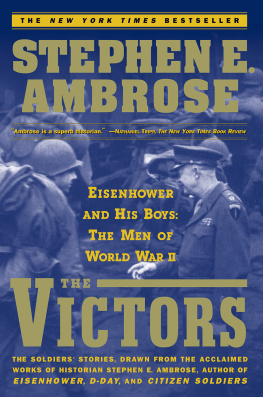

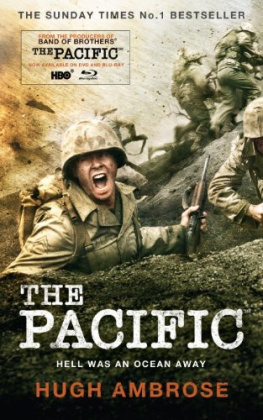
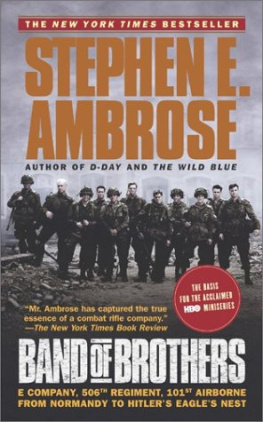
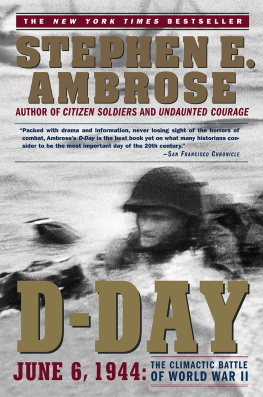
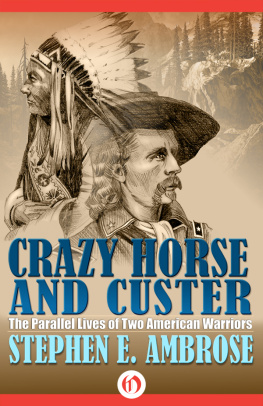
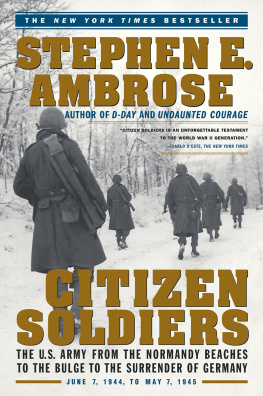
![Stephen Ambrose - Citizen Soldiers [Condensed]](/uploads/posts/book/457593/thumbs/stephen-ambrose-citizen-soldiers-condensed.jpg)

